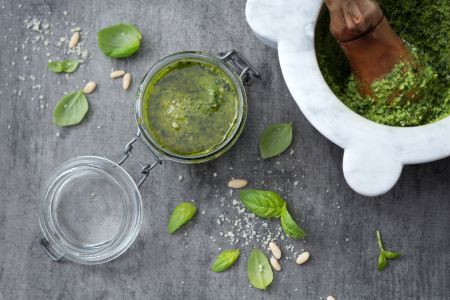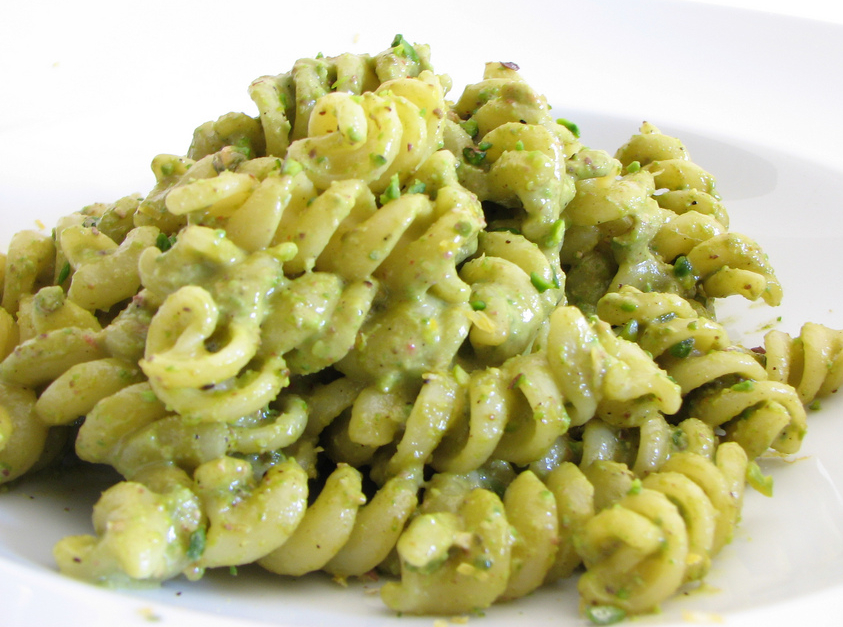Basil: a fragrant and fresh plant linked to a typical recipe of the Ligurian tradition
Il basil it is a plant that gives off an intense scent, particularly linked to the cuisine of the Mediterranean regions. But not only. It seems to come from the Regions of Asia and was spread to the New World with the conquest of the Americas.
Today, several varieties of basil: from the Greek one with small leaves to the Mexican one with purple leaves.
Il basil was known by the ancients as medicinal herb and it was used by the peoples of the Mediterranean including Greeks and also the Egyptians, who used it for embalming.
Its Latin name Ocimum basilicum comes from the Greek "Okimon" what does it mean "scent", to indicate precisely its pleasant scent that it emanates. Its Italian name instead derives from the Greek "basilikon " and it means “Royal plant"So much so that in French it is called precisely"herb royale".

Origins and legends related to basil and its beneficial properties
Il basil, a native of tropical Asia, was also known for its medicinal properties by the Chinese and Arabs. It was introduced into our kitchen by the Greeks and Romans. Although the first written texts that testify to the use of the plant in our kitchen are found only from the thirteenth century.
There is a legend that testifies to the importance and sacredness of this fragrant plant. This legend tells that Elena, mother of Emperor Constantine, found basil plants on the site of the Crucifixion of Christ. His perfume thus became famous for magic herb and sacred throughout the Middle Ages. It was considered poisonous at times and at times thaumaturgical.
The fresh and aromatic scent has struck the imagination in every age. To such an extent that Boccaccio in his Decameron he mentions basil as "the herb with which Lisetta da Messina buried her lover's head".
In particular, the cultivation of basil is linked to Liguria region in which a variety now recognized as DOP proper to the Region.
There are numerous therapeutic properties of basil. It is still used today in herbal medicine. It, dried and pulverized, helps to clear the respiratory tract. The dried leaves, if left to stand for about fifteen minutes in boiling water, can also be used for a digestive and decongestant infusion.
In addition, this fragrant plant is also an anesthetic for mouth wounds. Its essential oil, with sedative, anti-inflammatory and antidepressant properties, is used to heal congested skin.
Genoese pesto: a purely Italian recipe
Basil deserves a place of honor in our kitchen. In fact, it is very common in traditional recipes of Italian cuisine.
Pesto is included among the PAT of Liguria. That is, among the traditional Ligurian agri-food products cataloged and recognized in the list kept by MIPAAF. Today its use has spread throughout Italy. It lends itself to the preparation of first courses either alone or together with other ingredients.
The Genoese pesto recipe involves the use of garlic, in particular theGarlic of Vessalico, Slow Food Presidium of the Province of Imperia, grown in the Upper Arroscia Valley. In addition to garlic, basil, cheese, salt and oil are used. The quantities of ingredients vary from area to area and according to local traditions.
Il pesto genovese it is a typically Italian recipe. It lends itself to the use of ours DOP and ofGP, both for the choice of Garlic di Vescovo Dop, both for the basil and for the choice of cheese (pecorino or parmesan) and finally for the choice of the olive oil of which our territory is rich in PDO varieties.
In Italy there are numerous variations of pesto, which differ from Genoese pesto both for the type of dried fruit and for the type of herbs and vegetables used in the recipe.
Pesto, being a raw condiment, enhances the quality of the raw materials used.









